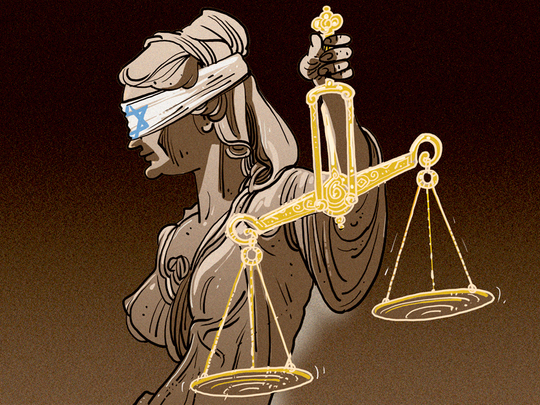
Between 1945 and 1949 a series of court trials were held in the city of Nuremberg, Germany. The purpose was to bring Nazi war criminals to justice for atrocities committed against civilian populations during the Second World War. Many of those charged with the crimes included Nazi Party officials and high-ranking military officers along with German industrialists, lawyers and doctors — all of whom were indicted on charges such as crimes against peace and crimes against humanity.
These trials set in motion a consensus to establish an international court, thus establishing an important precedent for dealing with cases of genocide and other crimes against humanity. In 2002, an International Criminal Court (ICC) came into existence to address the issue of crimes committed by nations and individuals against civilians with a view towards prosecuting them. The court, a permanent international tribunal has often been referred to as the “last resort for prosecution of genocide, war crimes, and crimes against humanity”.
In its short history, the court has chased down events relating to crimes of aggression primarily in some countries in Africa. Despite repeated calls, it continues to ignore calls for investigations into crimes committed by the Israelis against Palestinians. It has remained mysteriously silent on the massacres of the residents of Sabra and Shatilla and the butchery of civilians in Jenin crafted by Ariel Sharon, the Israeli premier at the time, followed by the public display of a pre-designed genocide of the women and children of Gaza at the behest of current Israeli premier, Benjamin Netanyahu.
In 2008-2009, in a military aggression designated Operation Cast Lead, Israeli forces reportedly killed over 500 women and children among the 1,400-plus casualties. A special UN commission to investigate possible war crimes held Israel responsible for most of the aggression. Naturally, Israeli leaders quickly objected and the commission head, a Mr Goldstone, retracted his judgement, although other members of the commission refused to back down in their assessment.
In the current Gaza holocaust, the world has witnessed first-hand live imagery of Palestinian children being blown to bits by Israeli bombs. They have also seen unadulterated images of victims in schools and hospitals specifically and deliberately targeted by Israelis seeking to strike terror into the heart of the resistance.
Perhaps the conscience of the world was not aroused because most of the victims had no faces or identities. No major networks devoted any significant airtime to bring to life the memory of some of those who fell to the Israeli genocide.
Chilling first-hand account
There are some journalists whose conscience and integrity arises above Israeli arm-twisting and monetary-lobbying boundaries. Joe Catron, writing in the Electronic Intifada, relates a first-hand account of Essam Jouda, a Gaza father who lost his wife and four children in northern Gaza in an Israeli air strike less than two weeks ago. These multiple deaths within a single family by a targeted Israeli bombardment added to the rising number of families who have lost more than one family member in the Israeli assault.
Relating those awful moments when the Israelis attacked, Jouda said, “At 4pm, I was inside the house. All the rest of my family was sitting in the front hall. Their mother was standing in the middle of the boys. They were playing as they were accustomed. Suddenly I heard a massive explosion ... I saw a huge mass of dust in the area and shrapnel scattered all over the hall.”
His eleven-year-old tugged at him screaming and wanting to know where her mother and siblings were amid all that rubble. After a feverish search he found them downed “with shrapnel everywhere and a pool of blood around them. It’s like they were swimming in it. There were six of them, five killed. I heard the voice of my son saying, ‘Dad.’ The others were scattered everywhere. You couldn’t distinguish between them because of the heavy shrapnel wounds [on] their faces.”
“The voice was [my son] Thaer. I carried him and left the house quickly. I felt my body cut from the shrapnel as I carried him. Then our neighbours took him and the rest of our family to Al Awda hospital.”
At the hospital, Jouda’s said: “In another bed, I saw my little boy, Osama. He was smiling in his sleep. I tried to hug and kiss him. There was no response. I tried to convince myself that he had returned my smile. And I refused to listen to anybody saying that he was dead.”
In another bed, he recalled, “I saw my wife covered by a sheet. I removed it quickly, and saw that she was also dead.”
As Joe Catron tells us, Jouda’s three other children had been transferred to another hospital. By the time he arrived to identify them, he said, “You could not recognise the features of their faces and heads.”
His final words, before breaking down in uncontrollable grief, were: “The international community must punish the Israeli war criminals and end the occupation as soon as possible.”
Over 750 women and children breathed their last at the hands of the recent Israeli brutality. More than 2,100 civilians have lost their lives with 11,000 injured and 100,000 left homeless. A UN report factually stated that 140 families in Gaza were partially or completely annihilated by the Israelis in a six-week period. Michael Ratner of the Centre for Constitutional Rights termed Israel’s planned ethnic cleansing and massacres of Palestinians “incremental genocide.”
When will the International Criminal Court begin to exercise its mandate? When the Palestinians are no more?
— Tariq A. Al Maeena is a Saudi sociopolitical commentator. He lives in Jeddah, Saudi Arabia. You can follow him on Twitter at www.twitter.com/@talmaeena










